
Related
Topics
Guests
- Lori Wallachdirector of Public Citizen’s Global Trade Watch and author of The Rise and Fall of Fast Track Trade Authority.
While the two parties have plenty to fight about in the new Republican Congress, Mitch McConnell, the possible next Senate majority leader, says he shares common ground with the president on international trade. What does this mean for the Trans-Pacific Partnership (TPP)? We get analysis from Lori Wallach of Public Citizen’s Global Trade Watch, who notes that while some analysts say GOP gains will accelerate the passage of fast-track legislation in Congress to enable an agreement on the TPP, “it is kind of hard for the Republicans to voluntarily delegate more authority to the guy they’ve been attacking as the imperial president who grabs power that’s not his.” The controversial so-called free trade deal involves 12 countries and nearly 40 percent of the global economy. Trade ministers from the 12 countries negotiating the trade deal are due to meet in Beijing ahead of the Asia-Pacific economic summit next week to continue negotiations.
Transcript
NERMEEN SHAIKH: With Republicans set to take control of Congress for the first time in eight years, President Obama has pledged to focus on compromise with the party. Republicans emerged from the most expensive midterm in history with a majority of seats in the Senate and their biggest majority in the House in more than 60 years. On Wednesday, President Obama addressed the new power dynamic in Washington.
PRESIDENT BARACK OBAMA: Today I had a chance to speak with John Boehner and congratulated Mitch McConnell on becoming the next Senate majority leader. And I told them both that I look forward to finishing up this Congress’s business and then working together for the next two years to advance America’s business. And I very much appreciated Leader McConnell’s words last night about the prospect of working together to deliver for the American people.
NERMEEN SHAIKH: Shortly before President Obama spoke Wednesday, Senate Majority Leader-in-waiting Mitch McConnell held his own press conference in Louisville, Kentucky. He said his first priority was, quote, “to get the Senate back to normal.” When asked what specific areas he could work on with President Obama, this was part of his response.
SEN. MITCH McCONNELL: Trade agreements. The president and I were just talking about that right before I came over here. Most of his party is unenthusiastic about international trade. We think it’s good for America. And so, I’ve got a lot of members who believe that international trade agreements are a winner for America. And the president and I discussed that right before I came over here, and I think he’s interested in moving forward. I said, “Send us trade agreements. We’re anxious to take a look at them.”
AMY GOODMAN: One of the international trade agreements in question is the Trans-Pacific Partnership, or TPP. Some analysts say Republican gains will accelerate the passage of fast-track legislation in Congress to enable an agreement on the TPP. The secretive trade deal involves 12 countries and nearly 40 percent of the global economy. Trade ministers from the 12 TPP countries are due to meet in Beijing ahead of the Asia-Pacific economic summit next week to continue negotiations.
To see how the Republican victory might impact these negotiations, we go to Washington, D.C., where we’re joined by Lori Wallach, director of Public Citizen’s Global Trade Watch and author of The Rise and Fall of Fast Track Trade Authority.
Welcome back to Democracy Now!, Lori. Start out by explaining just what the TPP is and what exactly McConnell says he has in common with the president.
LORI WALLACH: Well, the TPP, unfortunately, is really a delivery mechanism for a lot of the things McConnell and the Republicans like. So, for instance, it would increase the duration of patents for Big Pharma and, as a result, give them windfall profits but increase our medicine prices. It could roll back financial regulation on big banks. It could limit Internet freedom, sort of sneak through the back door the Stop Online Piracy Act, SOPA. And—they love this—it would give special privileges and rights for foreign corporations to skirt around our courts and sue the U.S. government to raid our treasury over any environmental, consumer health law that they think undermine their expected future profits, the so-called “investor-state” enforcement system. Plus, it would have the NAFTA-style rules that make it easier to offshore jobs, making it easier to relocate to low-wage countries.
So, the sort of grotesque question is: Why does President Obama like the TPP? It’s pretty clear why McConnell likes it. It was negotiated with the assistance of 600 corporate advisers, official corporate trade advisers in the U.S. The agreement has been the initiative of the Obama administration. It was started by Bush, but instead of turning it around and making it something different, the Obama folks picked it up and, frankly, have made it even more extreme. So, the question really, in a way, is, the Democratic Congress—the Democrats in Congress and the public, including a lot of tea party conservatives, have plenty not to like. Oh, I forgot about the part of TPP where it bans Buy America, Buy Local. Really bad agreement, 29 chapters, only a few of them about trade, so it’s really a sneak attack branded as a trade agreement.
And the key to that, probably, is right now a fight between the U.S. and Japan in agriculture. So there’s a little weird twist there, where the Republicans in Congress have said that either Japan has to get rid of all of its tariffs on agriculture products or it should be thrown out of the agreement. In a weird way, it’s not clear to me that the Republicans taking over makes it actually easier for Obama to make that deal, given they’re the ones who have been particularly harsh about that issue. But there is this big negotiation coming up in China in a week. And this was supposed to be the deadline to finish TPP, which, with any luck and a lot of citizen activism in all the countries, is not going to happen again.
NERMEEN SHAIKH: And you actually make the point, Lori Wallach, that even the fast track is not likely to go any quicker through Congress as a result of this Republican win. Could you explain why that is?
LORI WALLACH: So, a lot of people who might read the mainstream media have seen all of these stories saying, oh, the thing that’s going to happen really quickly is Congress is going to delegate its trade authority, its constitutional exclusive control over trade, to the president through this old Nixon-era, very extreme procedure, rarely used, called “fast track.” And that’s a procedure that basically gives Congress’s authority over trade to the president. Congress ends up handcuffed, and an agreement gets negotiated, signed before the Congress ever approves it, and then the president gets to write legislation. It’s not subject to committee amendment, and it gets a guaranteed 90-day vote with no amendments. Couldn’t we wish that we had that kind of procedure for legislation we like? So that procedure has only been used 16 times in the history of the country, but it was used for NAFTA and the World Trade Organization.
Congress—for this whole Congress, the president’s been trying to extract that from Congress, that extreme authority, and Congress has said no. So the big question now and the big PR campaign by the corporations is, “Oh, with the Republicans, it’ll be a snap.” The reality is, actually, the fight over this is in the House of Representatives, and there are plenty of conservative tea party members of Congress who, number one, think this violates the Constitution. It does break some of the most important checks and balances. It lets the executive branch diplomatically legislate. But in addition, it’s kind of hard for the Republicans to voluntarily delegate more authority to the guy they’ve been attacking as the imperial president who grabs power that’s not his. So, the fact in the matter is that if we all do our work, starting now—it’s going to be really rough between now and August, when Congress goes on August recess—there’s a very dangerous window, where, for sure, McConnell and Boehner and Obama are going to want to play footsie on fast track. But the math doesn’t really change enough in the House, if we do our work, that we can’t save ourselves from it. And that’s the reality underneath all the corporate hype.
AMY GOODMAN: Lori, I want to turn to a clip from one of McConnell’s ad campaigns. After his opponent, Democrat Alison Lundergan Grimes, criticized McConnell for supporting foreign trade agreements that export jobs, the McConnell campaign released an ad refuting the allegation, saying he has, quote, “fought against unfair foreign trade.” This is a clip.
TEAM MITCH AD: He’s been called a hero for saving Kentucky jobs. At Cardinal Aluminum, Mitch helped save hundreds of jobs when he fought against unfair foreign trade. At Blue Grass Army Depot, Mitch stopped a budget shortfall from hurting hundreds of working families.
AMY GOODMAN: Can you translate, Lori Wallach?
LORI WALLACH: Well, I couldn’t, really, using words that would be appropriate for broadcast, but—the baloney, I guess, is what I would say. So, the back story of that is that McConnell, the guy who, as a Republican in Kentucky, where there are no Democrats in Congress, would be a shoe-in, right, to get re-elected, but actually the Democrat who challenged him is suddenly catching up on him, and people start looking at that race, saying, “What’s going on?”
Well, it turns out she did ad after ad, and so did the national Democratic Senate Campaign Committee and others, that attacked him, because in 20 of 20 trade votes, the man has voted for offshoring-job, importing-bad-food, undermining-our-future trade agreements. The guy has never not seen a NAFTA-WTO-CAFTA-China trade agreement he does not love. So she starts running these ads about him voting for these agreements and the job offshoring. And Kentucky, as well as everyplace else in the country, has been clobbered. You can go to our website, TradeWatch.org, and look up the certified job loss from these trade agreements for your state, your city. So, they start running these ads. His numbers start to go down; hers start to go up. There are so many of these ads, the man has to basically run an ad campaigning against his own record to try and cover himself on his bad trade record.
And that’s a lesson, again, back to fast track, of why we can still win. People should not be disheartened about the prospect of having fast track dumped on us. Enough conservatives, because it’s a conservative state—enough conservatives get it, too. No one wants job offshoring. No one wants foreign corporations skirting our courts and going to international tribunals to raid the Treasury. No one is for banning Buy America or Buy Local and losing control of how our tax dollars are or not reinvested in our communities.
AMY GOODMAN: What do you mean, banning Buy—
LORI WALLACH: This is a transpartisan issue.
AMY GOODMAN: What do you mean, banning Buy America?
LORI WALLACH: So, a provision in the TPP would require—and this is done. Part of the agreement isn’t done, but this part’s done. And it would require us, when we buy—when the government buys automobiles, buys pens, everything, paper, office furniture, that right now, under the Buy America Act, which has been around since Roosevelt, if it’s made in America and there’s enough of it to actually supply the government, if it’s available, you have to use the government money to buy American goods, which is great because it reinvests the money back into more jobs in our country. And also, that Buy America policy is used to create new, really, innovations. So, before we had auto efficiency requirements for cars in the private sector, there was a standard that was set up, the CAFE standards—was for government purchases, so that the companies would actually have a market to do the right thing. That’s being done right now for renewable energy purchases, the Renewable Portfolio Standard. So we use this both to create jobs at home and to create industry innovations to promote our policies.
In the TPP, verboten. You have to give equal treatment to any good made in any TPP country for any government contract over a certain threshold, regardless of the Buy America rule. It gets waived. And so, for instance, all of the Chinese government-owned companies in Vietnam, which are constantly getting written up for their terrible conditions, we’d have to have a bid from them, where obviously things would be cheaper than, say, furniture made in North Carolina, where otherwise the government would be buying office furniture in the U.S. with U.S. money. And this is also the rule that was in NAFTA. It snuck in a ban on Buy America for any company in any trade partner country. The big deal on this is, with the TPP, of course, this is supposed to be what’s called a launching agreement, so every other country that wants to join can join. So, basically, it’s—with all of the problems in TPP, it’s bigger than already the 12 countries that are in it, because any other country can join.
AMY GOODMAN: But Lori, what is it—
LORI WALLACH: It would undermine Buy Local.
AMY GOODMAN: What if you refuse to do that? What if you said, “No, we’re going to buy America”? What’s the enforcement mechanism?
LORI WALLACH: So, that’s a very good question because, unlike most of our international agreements, the TPP has two strong enforcement mechanisms. First, if the U.S., for instance, were to continue to buy American and give that preference to our domestic economy, or, for that matter, states with Buy Local or communities with Buy Local school food, all of those things would be a violation of that agreement. Then, what happens is, any other country can drag the U.S. into a TPP tribunal, and if we don’t get rid of the law, the U.S. would face perpetual trade sanctions, fines. This is actually enforceable international corporate law.
But worse, in the TPP, the TPP provisions on investment would make some of the TPP constraints on policy actually enforceable by private individual companies, when an individual company could privately enforce a public treaty by insisting the U.S. government compensate the private investor or company out of our taxpayer dollars for any violation of the agreement that undermines their expected future profits. So, while we have multilateral environmental agreements or human rights or labor rights agreements, that aren’t that enforceable—we set the standard internationally, but each country is supposed to enforce it domestically—there’s no sanction. With TPP or the WTO, there are sanctions. There is the ability to extract cash. And that’s what makes these agreements so dangerous and why everyone needs to talk to their member of Congress in the House of Representatives and get an eye-to-eye commitment: Will you vote no on fast track? Do not give away your constitutional authority, to save us from these bad trade agreements.
NERMEEN SHAIKH: Lori Wallach, so, could you say a little about where Democrats and Republicans stand on these precise provisions that you’ve just outlined of this treaty? You’ve said that both Democrats and Republicans are very unhappy. The one thing they agree on is our current trade status. So how is it that they would wish to resolve it, and how the TPP fits into that?
LORI WALLACH: So, number one, you can go and actually see the polling of the public polling. We keep a running summary at our website, TradeWatch.org, that shows you this stunning agreement across this very divided country between Democrats, Independents and Republicans. And conservative Republicans and progressive Democrats actually agree the most against TPP, against fast track, against the investor tribunals, against the ban on Buy America. The corporate middle of each party is mushier.
As far as the members of Congress, so the way the math works—and this is the House of Representatives where this fight’s going to happen—almost all the Democrats are against the old fast-track system, the legislative luge run that rolls bad trade agreements right over Congress. However, in the Republican Party there’s a split. One should not write off talking to one’s member of Congress if they’re a Republican. There is a Wall Street versus Main Street split in the Republicans. The more conservative and the more moderate of the Republicans are against fast track. The sort of corporate, “main,” Wall Street contingent are for fast track. That’s what the Chamber of Commerce wants. So, interestingly, the more progressive—there are a handful of progressive Republicans. They support labor rights, etc. Those guys and gals and the tea party conservatives, together, are the bloc of Republicans who don’t want fast track.
And by the way, this is not just right now. When President Clinton, Mr. Trade Expansion, tried to get fast track himself, because he only had it for two of his eight years as president, he was defeated on the House floor when 171 Democrats were joined by 71 Republicans in 1998, who said, “No, we are not going to give away our constitutional trade authority, to make sure that these trade agreements don’t rewrite our domestic laws, don’t offshore our jobs.” And that combination of left and right maintained trade authority for the Congress, and Clinton was denied. And, in fact, in the last 20 years, there’s only been a delegation of fast track for five of the last 20 years. So it would be an anomaly if suddenly Congress caved in.
But you know, with this election, that is going to be one of the top things that’s going to come right out of the shoot in January. So, folks don’t want TPP. They don’t want fast track. And if they don’t want fast track, you’ve got to get to your members of Congress now and get a firm commitment, including those new members who are coming in. So, as soon as they come here, they are going to be marinated in corporate lobbyists. You’ve got to get them before it’s too late. Once they’re here in January, they’re going to be in the soup. So there’s a window between now and before Congress starts, the new Congress, to get to your new members of the House of Representatives and get a direct, eye-to-eye “I will vote no. I will hold onto my constitutional authority. I will represent you, not give away the authority to be able to represent you in Washington.”
AMY GOODMAN: Lori Wallach—
LORI WALLACH: And, of course, go to your old members, as well.
AMY GOODMAN: Very quickly, we just have a minute, but two things. Obama, President Obama, is going to Beijing for the APEC summit, Asia-Pacific Economic Cooperation summit. What’s going to happen there? And does it matter who’s in charge of Congress, the House or the Senate, based on what you’re saying, around so-called free trade?
LORI WALLACH: Well, it does matter, in the sense that is probably the case that the corporate agenda on trade has a friendlier ear with, say, a Mitch McConnell as compared to a Majority Leader Reid, who personally just said, “I am not putting fast track on the floor.” He just said, “No, basta.” So, in the sense that the Senate is not really where the fight is—but it was very helpful to have Senator Reid saying, “We’re just not doing it,” and he shut down the whole thing—that is not good for us. But the fight over whether or not fast track can be passed is the House. In the Senate, the bill always passes. In the House, it’s often been stopped. So the House is where the fight is. So, yes, it matters.
However, on the APEC issue, whether or not there’s a TPP, to some degree, is not so much, as I said, affected by who is in Congress, except the Republicans have been tougher on some of the agriculture market access issues. What’s going to happen at APEC is, everyone who’s worked against TPP in the country should feel great, because you’ll remember this was the deadline President Obama set in June to finally be done with this, and it was supposed to be done last APEC, last year at this time, and they’re still not done. And that’s because our brothers and sisters in the other countries, as well as folks here—and today is the start of a national action day on TPP. If you go to TradeWatch.org, you can figure out about the activities going on around the country. Or go to CitizensTrade.org, see a list of all the activities. Same thing is happening in Australia and New Zealand and Singapore and Malaysia and Japan. And so, this campaigning has caused enough upset, that even though all the heads of state—Obama’s going to China, he’s going to be with all the other heads of TPP countries—they had hoped to have a signing ceremony. And with any luck and a little more campaigning, they won’t. But if we don’t stop fast track, it will be right over our shoulders in January, February, March, that they will make a deal. So it’s very dicey right now. We can make the difference.
AMY GOODMAN: Lori Wallach, thanks so much for joining us. It is kind of funny that the Republicans take the Senate, and President Obama heads to China. Lori Wallach, director of Public Citizen’s Global Trade Watch, author of The Rise and Fall of Fast Track Trade Authority.
This is Democracy Now! When we come back, the co-founder of Ben & Jerry’s—that’s right, the ice cream company—[joins] us. But what happened in Maui, in Hawaii, around the issue of genetically modified foods? Stay with us.

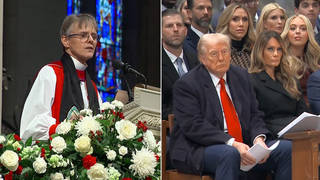
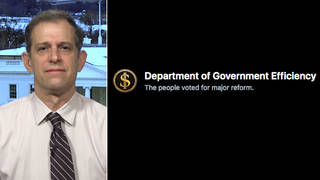
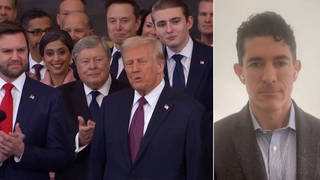
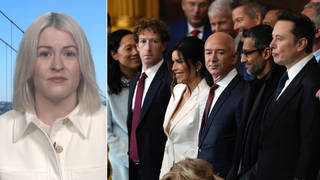





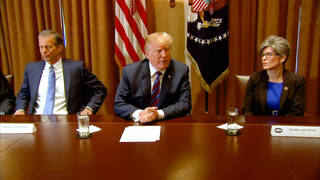
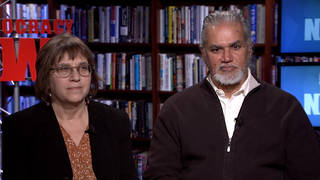
Media Options